First state to complete data collection will be from Northeast
November 11, 2022 11h07 | Last Updated: November 16, 2022 16h48
Piauí, Sergipe, Rio Grande do Norte and Alagoas run to complete the operation in November.
Having passed 100 days of household collection of the 2022 Population Census, the states of the Northeast maintain the highest percentages of ascertainment: Piauí (90.8%), Sergipe (86.7%), Rio Grande do Norte (85.9%), Alagoas (84.2%), Maranhão (81.2%), Paraíba (80.8%), Pernambuco (80.6%), Bahia (74.1%) and Ceará (72.5%). Also in that range were Amazonas (80.8%) in the North and Santa Catarina (72.0%) in the South. All of them above the national average, which is 69.0% now, the same range of Minas Gerais and Tocantins. The other states are below that average. In this pace, without an unforeseen event, the first state to conclude in November the census operation will be from the Northeast, an operation that started on August 1st and should extended to mid-December.
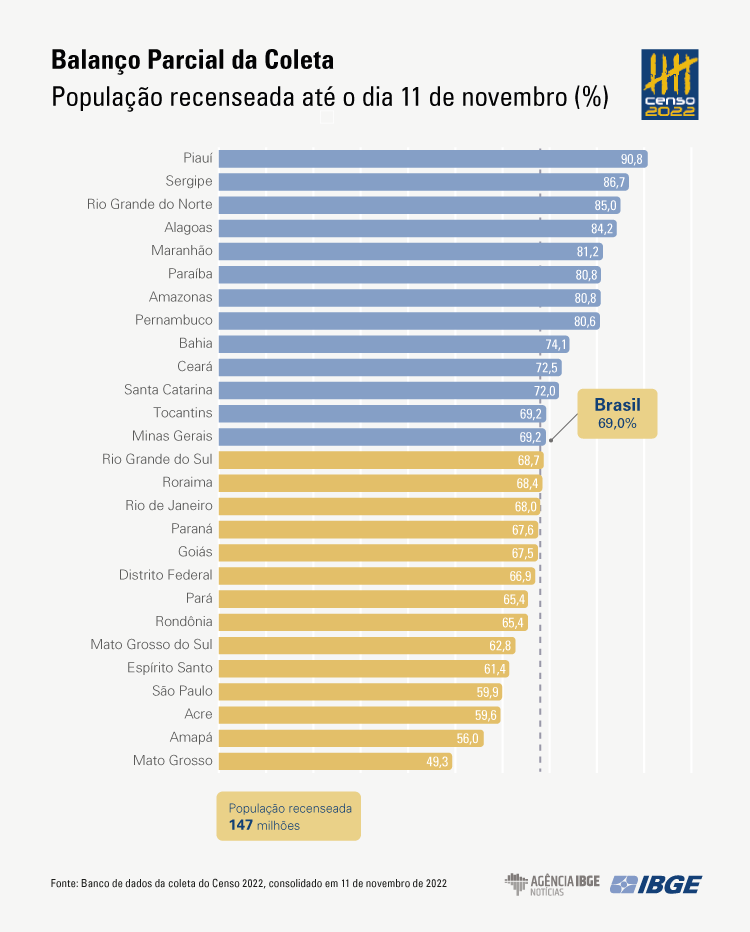
“In some municipalities, the data collection work is being reinforced by Census analysts and active servants. Incentives like the raise of compensation rates and bonuses per productivity helped to stimulate and increase the production in the final stretch,” highlights Raniere Leite, Operational Coordinator in Piauí, one of the leaders of the data collection.
Leonardo Passos, the Superintendent of Piauí, lists some positive actions: “The involvement of all servants, the continuous follow up of the teams and the intensive dissemination of the operation. It should be highlighted the administrative action to summon every enumerator, assuring a higher percentage of attendance to the training classes.”
In Sergipe, Hellie Mansur, the Operational Coordinator, emphasized similar efforts. “Enumerators were encouraged to work on weekends, with a bonus per questionnaire filled, as well as teams in municipalities about to complete were relocated to slower ones.”
The state also worked previously the contact with condominiums, the biggest difficulties in the Census. “Months before the beginning of the data collection, we carried out events and partnerships with Secovi-SE, aiming at previously contacting the administrators. Which helped us a lot. Residents already knew about our visit, streamlined the reception of enumerators and that provided more security to all of us,” explains Adriane Sacramento, the IBGE Superintendent in Sergipe.
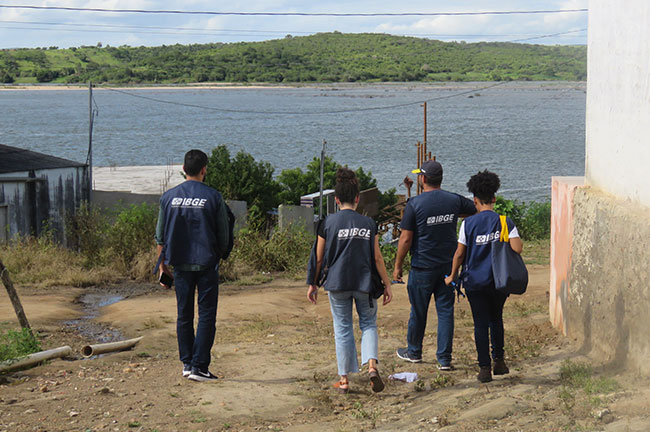
Also a superintendent in Alagoas, Alcides Tenório Júnior reinforces the collective spirit. “Our result is due to the commitment and professionalism of our team. We kept a good complementary flow of training and recruitment of enumerators. We established the strategy of dedicating more time of the supervisors in the initial follow up of enumerators. Therefore, it was possible to guarantee a better preparation and agility of those colleagues. Finally, it is important to mention our capacity of dissemination in the local media, with constant insertions.
“Here in Rio Grande do Norte, it is also the result of an articulate set of actions: administrative and technical coordination to guarantee resources, personnel, information and decisions at the right time and place; field workforce hired with a reasonable contingent to cover it; cooperation of the population, which sticked to appeals of the IBGE to exert the citizenship duty of answering the Census. We are also relocating the workforce from completed places to areas difficult to cover due to the lack of personnel,” explains Damião Ernane de Souza, the IBGE Superintendent of Rio Grande do Norte.
“We have to celebrate as they are unimaginable victories, achievements, overcomings for ordinary citizens,” states Eduardo Rios Neto, the President of the IBGE. “Like in other Censuses, enumerators deal with externalities which, in many cases, go beyond routines, beyond regular professional activities,” observes him. “To portray a country with such diversity as Brazil, interviewing rich, poor and remedied people, enumerators need to resort to boats, motorboats, cars, carts, motorcycles, bicycles - from planes to horse rides,” reminds Rios Neto.
Cimar Azeredo, the IBGE Director of Surveys, also celebrates. “Beyond unforgettable images like data collection in Indigenous villages, quilombola communities and rural areas, the 2022 Census has been producing situations and moments of much pride and much emotion.” Indeed, the list is long in this aspect.
In Piauí, enumerator Paulo Eugênio Moreira Santos saved a newborn baby from choking. “I believe that God puts us in certain places. I was already leaving when I decided to return to that last house,” stated the servant. He found the child´s mother and a neighbor crying for help.
Still in Piauí, a father left his job to follow his son, a wheelchair user, in his first job as a supervisor in the 2022 Census: “My father is my two legs,” said 28-year old Francisco de Assis Moura about the support of farmer Juvenal Mendes. In the beginning of the operation, in only one week of work, they covered more than 50 blocks in the neighborhoods and in downtown Picos.
Also in that state, enumerator Carlos Daniel Rodrigues da Costa Leal is using a drone to easily locate residents in the interior of the city of Canto do Buriti, 408 km far from Teresina.
BONDS, AFFECTION AND FAMILY AFFAIRS ARE STRONG BRANDS IN THE CENSUS
In Rondônia, an Indigenous tribe paid a tribute to an enumerator giving her name to a child
Twenty-three-year old Sandy Cáseres Borges was collecting data in the community of Rio Negro Ocaia, in Guajará-Mirim, ten hours far from the capital, navigating in a motorboat. A family of the Oro Nao ethnicity decided that Sandy would be the name of a newborn baby. “It was touching. They loved me and they did not want that I return to the city,” says Borges, proudly.
In Amazonas, mother and daughter work together as enumerators
Forty-five-year old Geoconda Mendonça and her daughter, 19-year old Geovana Mendonça, cooperate with each other. Both of them stand out in the Census data collection. Geoconda Mendonça applied more than 1,500 questionnaires on her own. “One of our strategies to quickly complete an enumeration area is not losing time with absences,” teaches her. “If persons are not at home, we move to the next house. In the end, having interviewed every people at their homes, we then focus on the absences. We come early on weekends and stay late at night in order to complete the enumeration area as quicker as possible,” reports Geovana Mendonça.
In Amapá, mother and son are enumerators as well
Thirty-seven-year old Karine Lopes dos Santos and 17-year old Emanuel dos Santos Marques study together. Both of them are completing secondary school and decided to test their knowledge in the IBGE´s selection process for the 2022 Census. The enumeration area of Santos and Marques have a lot of stilt houses, which they access by motorboats and bridges.
In Pernambuco, 18-year old twins Yasmin and Ysabelle Cavalcanti dos Anjos are partners in life and in the Census
The sisters stand out as enumerators in Ribeirão. For them, the IBGE provided them an opportunity to get their first job together. After completing the secondary school, Yasmin and Ysabelle enrolled in the selection process to work in Zona da Mata in the south of the state, where they live. Both of them were approved and began to work as enumerators on August 1st, the first day of data collection.
In Ceará, seven-month pregnant enumerator has already nearly 800 questionnaires filled
Twenty-four-year old Shiley de Souza works in the municipality of Itapipoca, in the interior of the state, where she stands out in a team of 70 agents. She is in the seventh month of pregnancy of her first child and she has worked in the 2022 Census since she was in the fourth month. “I needed to work, saw the opportunity and I enrolled. I found out that I was pregnant after the test. I didn´t give up, I continued,” tells the enumerator, who has already nearly 800 questionnaires filled. Taking little Fred Arthur in her belly, Souza covers the streets of the city preferably from Monday to Friday at business hours. Whenever necessary, however, she leaves at night to find those people who were away from their houses during the day.
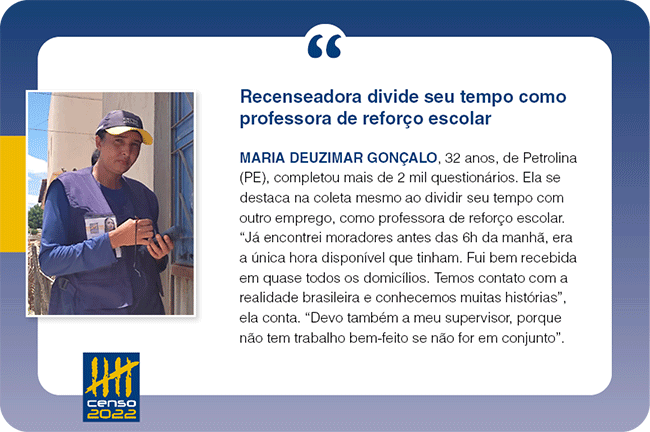
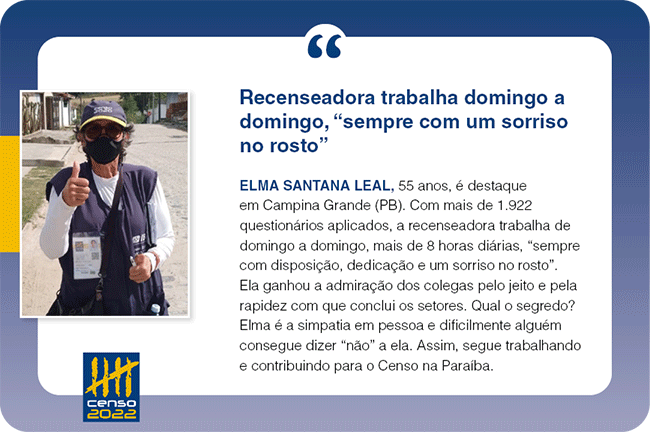
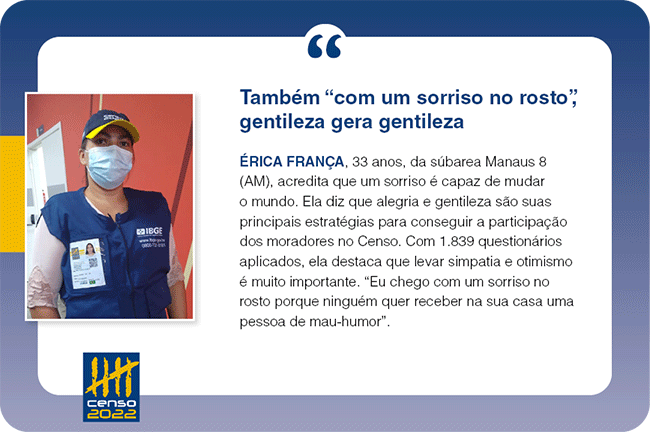
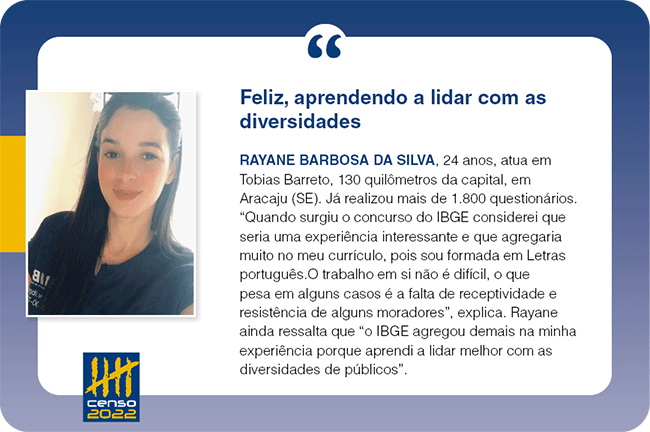
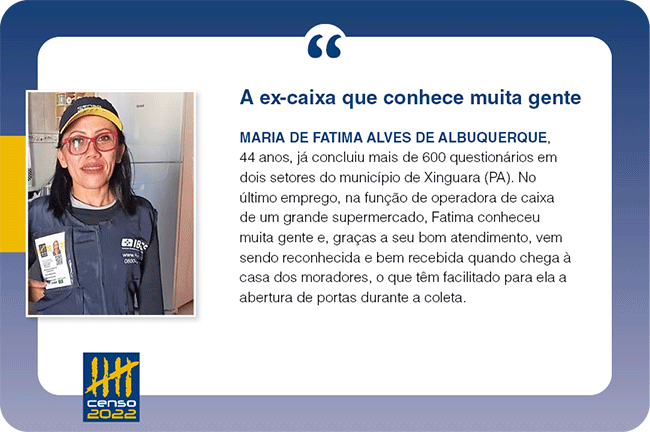
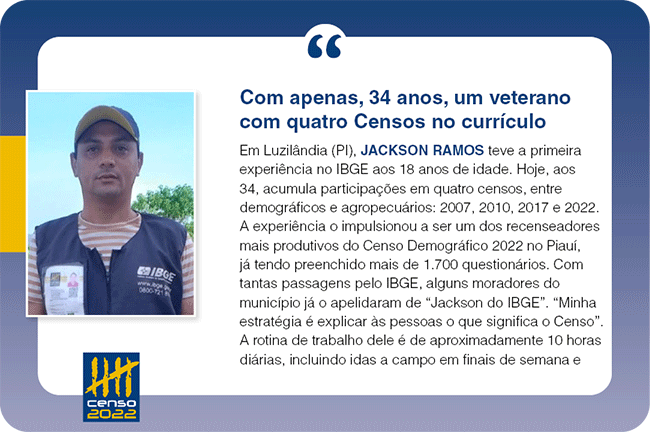
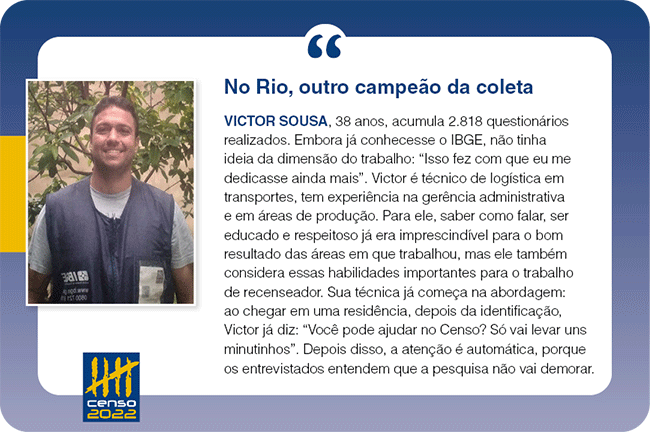
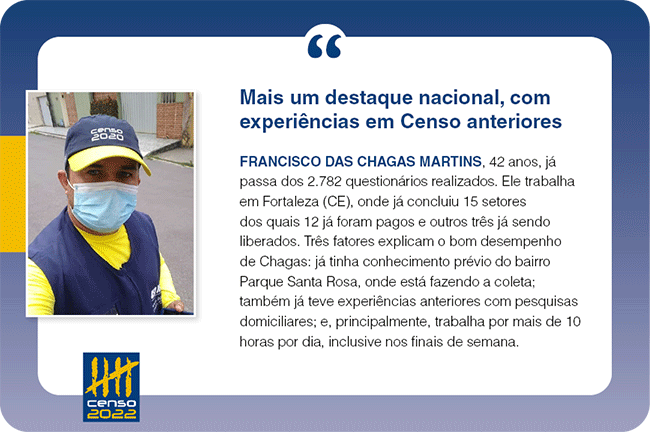
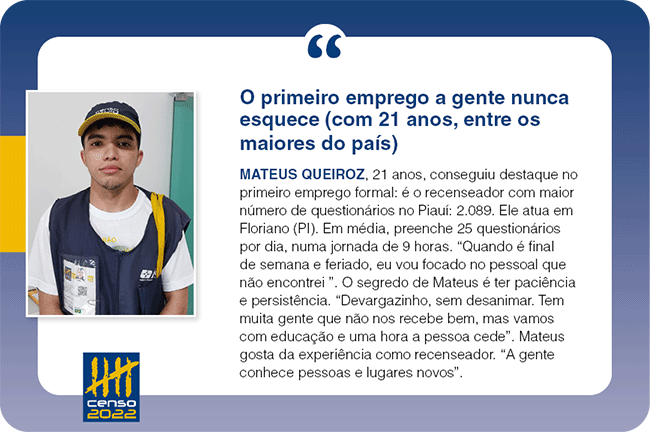
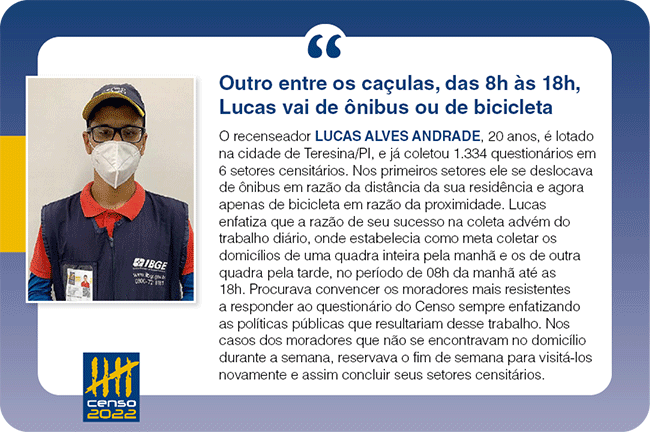
OTHER STORIES
The speedy man from Alagoas is the national data collection champion
With more than 3,032 questionnaires filled, the data collection champion in Brazil didn´t have any idea of what the Census was. Twenty-one-year old João Carlos knew about the selection process and soon perceived a chance to raise money. “I believe that life is a competition and it forces us to always be the best as we can. However, I didn´t expect to reach such performance of being the most productive enumerator in Brazil, it was a surprise for me.”
Experience counts: enumerators above 60 years show their value
They have already surpassed 60 years and proudly wear the IBGE´s blue vest and yellow flap cap. With different accents, world perspectives and life histories, they take in common the willingness for work and competence to complete their enumeration areas. Check a sample of testimonies of some senior colleagues who are helping to portray the Brazilian reality from north to south since August 1st.
Municipality of Ouriçangas (BA) stands out with a 100% female team
“Women should be where they want to be.” Using the famous statement in the fight against machismo, census agent Rejane Oliveira explained the symbolical importance of the work of the Population Census in the small municipality of Ouriçangas (143 km far from Salvador), where the census team comprises only women. Oliveira, who heads eight enumerators, approves to work only with women: “We understand each other, each one supports each other. And we understand that we are together for a single ideal, which is providing a service of quality.”
Enumerator builds and drives his own canoe to arrive in Indigenous lands
Lucas Adriano did differently: he decided to build and drive his own vessel. He believed that he would save time and money. And he is confident that he had a good idea. “Doing the calculations of the time to collect the data and how much I would be charged for the trips, I perceived that it would be cheaper to build a canoe. A manufacturer guided me and I did it on my own. This is the first time I did it, it has some flaws, but it serves quite well.”
Enumerator writes 82 notes for residents: “Please meet me.”
